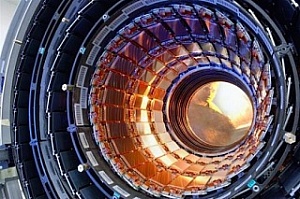A TSU team has received a grant from the government of the Russian Federation to create a world-class center for analyzing the data of the Large Hadron Collider in CERN (Switzerland). The project is designed for three years, with 30 million rubles allocated annually. The project manager is Professor Dmitriy Tsybyshev from Stony Brook University, USA (Hirsch index 70).
This grant will be a continuation of the work of the TSU research
group in the ATLAS collaboration at the Large Hadron Collider. In 2016,
the University entered the project of the muon spectrometer of the ATLAS
experiment, where Tomsk scientists under the leadership of Alexander
Khodinov study the decay of the Higgs boson into two muons (the muon is a
heavier analog of the electron). Their task is also to upgrade the
ATLAS muon spectrometer to increase its sensitivity for recording the
decay of the Higgs boson. To do this, the scientists are developing new
detectors equipped with multifunction microcircuits.
- I am very happy that we managed to win in this prestigious
competition, and I would like to thank the management and employees of
Tomsk State University for the trust they have shown, said Dmitry
Tsybyshev, grant director. - This grant will significantly expand the
participation of TSU in the analysis of data from the ATLAS experiment
at the Large Hadron Collider on a par with the leading universities in
Europe and the United States.
Thanks to the megagrant, the ATLAS Data Analysis Center will be
established at TSU until 2020. To do this, scientists will develop and
create a specialized tool – the so-called cluster for data analysis –
with the university supercomputer SKIF Cyberia. Processing Big Data will
involve machine learning systems and artificial intelligence. The
performance of such artificial intelligence systems increases
significantly with the use of additional computational accelerators such
as GPU and FPGA.
Currently the study of the properties of the Higgs boson is one of the
central areas in high-energy physics, because this is the last open
fundamental particle. In addition, these fundamental studies will answer
some questions about the origin of the universe.
The key employees of the new center will be Alexander Khodinov, head
of the Laboratory of Experimental High Energy Physics at TSU, and
Alexander Vanyashin, a senior researcher at the laboratory. Students,
graduate students, and post-graduates will be engaged in data analysis
and participate in the work on the support of detectors and in their
further modernization.
The center will have not only the most modern computer and laboratory equipment but also prototypes of the charged particle detectors operating at CERN. The center's staff will be active in the ATLAS pilot program.

